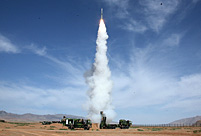At the recent 2013 Four Northeastern Provinces Cooperation Leaders' Conference held in Ordos, Inner Mongolia, Tan Zuojun, vice governor of Liaoning Province and former general manager of China State Shipbuilding Corporation, revealed that development of China's fourth-generation nuclear submarines and other high-tech weapons and items of equipment in the Northeastern Provinces of China had been completed. The news attracted considerable attention.
The fourth generation nuclear submarine features high performance and low noise
Military expert Du Wenlong pointed out that the main characteristic of the fourth generation nuclear submarine would be its high performance. Compared with earlier submarines, modern attack submarines differ significantly in offensive power, possessing both anti-submarine capabilities and also strong potential for anti-ship action and attacks on land-based targets. He pointed out that the fourth generation nuclear submarines of the United States and Russia already have these capabilities; China's fourth-generation nuclear submarines too will be equipped with the appropriate torpedoes, along with missiles suitable for use against other sea-going or land-based targets. In addition, the Chinese submarine will have low noise output, a key indicator for measuring a modern nuclear submarine's underwater survival capacity, as well as its ability to remain hidden during maneuvers, or undetected while launching an attack. He pointed out that the fourth-generation nuclear submarine will possess effective noise damping features, such as a quieter nuclear power plant with less vibration, and a more advanced hull muffler system, so that it will be difficult to detect even if within range of enemy sonar.
On the question when the fourth-generation nuclear submarine will enter service, Du Wenlong said that completion of development and completion of construction are two different phases - the cycle from completion of development to manufacturing, and then to fitting out and launch, can be very long, perhaps several years. Progress is determined by two factors: one is technical indicators, and the other is strategic need.
A significant enhancement of nuclear counterattack capability
Analysts believe that continual development of attack submarines and strategic nuclear submarines at times of peace, adding better performance and greater combat ability, can enhance strategic deterrence capability. China's strategic nuclear forces are weapons to deter third parties from becoming involved in local conflicts. China firmly adheres to the principle of non-first use of nuclear weapons, but the existence of strategic nuclear submarines will give China a stronger voice and more room for maneuver in the case of any crisis. In addition, Song Xiaojun points out that the United States, Russia, Britain and France all possess modern strategic nuclear submarines as a symbol of their status as 'Great Powers'; it is natural that China should be unwilling to lag behind.
 Storms leave 97 dead, 58 missing in Mexico
Storms leave 97 dead, 58 missing in Mexico New model of indigenous surface-to-air missiles testfired
New model of indigenous surface-to-air missiles testfired  118.28-carat diamond to be auctioned in HK
118.28-carat diamond to be auctioned in HK Maternal love under streetlight
Maternal love under streetlight Naked foreign student sits in the middle of a road in Haikou
Naked foreign student sits in the middle of a road in Haikou  Colorful Yunnan: Enjoy the natural beauty
Colorful Yunnan: Enjoy the natural beauty Harbin named Chinese city with most beautiful women
Harbin named Chinese city with most beautiful women New college students' military training in Guangzhou
New college students' military training in Guangzhou Rugby girls
Rugby girls PLA's 38th Group Army conduct training
PLA's 38th Group Army conduct training Residences of the royal house of Savoy
Residences of the royal house of Savoy The last days of Wan Aihua
The last days of Wan Aihua Highlights at 12th National Games of China
Highlights at 12th National Games of China Beijing Film Academy welcomes freshmen
Beijing Film Academy welcomes freshmen Large mahjong party sets new world record
Large mahjong party sets new world recordDay|Week|Month